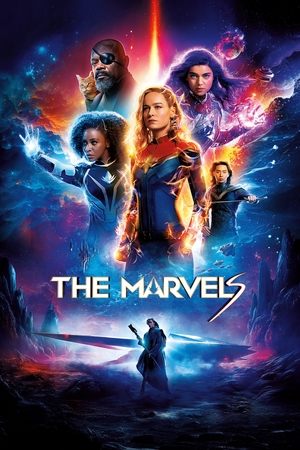
The Marvels
When I first heard the title of this movie, I thought it was about a 1960s girls’ singing group. And, frankly, that would have probably made for a better movie. Writer-director Nia DaCosta’s third feature outing and the latest in the Marvel Universe paradigm is a wildly inconsistent superhero movie that tries too hard to do too much and doesn’t have a script to support it. Too many of its plot elements aren’t adequately explained until well into the story, while others aren’t explained at all, leaving viewers who aren’t comic book laureates wondering what’s going on (particularly at film’s end). Meanwhile, other narrative aspects frequently appear gimmicky and grow old quickly, such as the introduction of the primary superpower that its three protagonists share, one that almost becomes slapstickish after an all-too-brief while. On top of that, the CGI effects vacillate from one end of the quality spectrum to the other, creating a mix of images that are either startling to look at or stunningly cheesy at best. Add to that a villain that isn’t particularly menacing, along with attempts at humor that either succeed brilliantly (cat lovers take note) or fall flat and look incredibly lame (as aficionados of musical theater will undoubtedly attest), all of which further add to the picture’s pervasive inconsistency. The inclusion of ample clues for advancing the overarching Marvel Universe storyline continues here, too, furthering a trend that’s growing tiresome in the studio’s releases, a development akin to the “Paul is dead” legacy come to life with every passing picture. Then there’s the trio of heroes themselves, who often appear more like they’ve been plucked from a giddy slumber party flick or a Cyndi Lauper video than taking center stage as seriously empowered champions in an action-adventure offering. All of these failings combine to make this production more of a forgettable placeholder in the Marvel mythology than a standalone feature (not to mention a pale substitute for a sequel to the far-superior film that launched the Captain Marvel franchise in 2019). In short, “The Marvels” is as much of a mess as it is a movie, and that’s troubling for several reasons. It lends credence to the growing criticism that films like this aren’t to be taken seriously. It reinforces the notion that they’re cookie-cutter in nature, easily interchangeable with one another. And it raises questions about the career choices of lead actress Brie Larson, who, though quite capable of playing roles like these, is running the risk of becoming type-cast, a troubling prospect for an Academy Award-winning actress who possesses a depth of talent and is handily adept at taking on better and more serious material than this. In the wake of this release, Marvel Studios should take a step back and seriously assess where its future is headed, especially if movies like this are any indication. As pictures like “Wakanda Forever” (2022) show, the studio is capable of better work – and it’s time to show viewers that.
